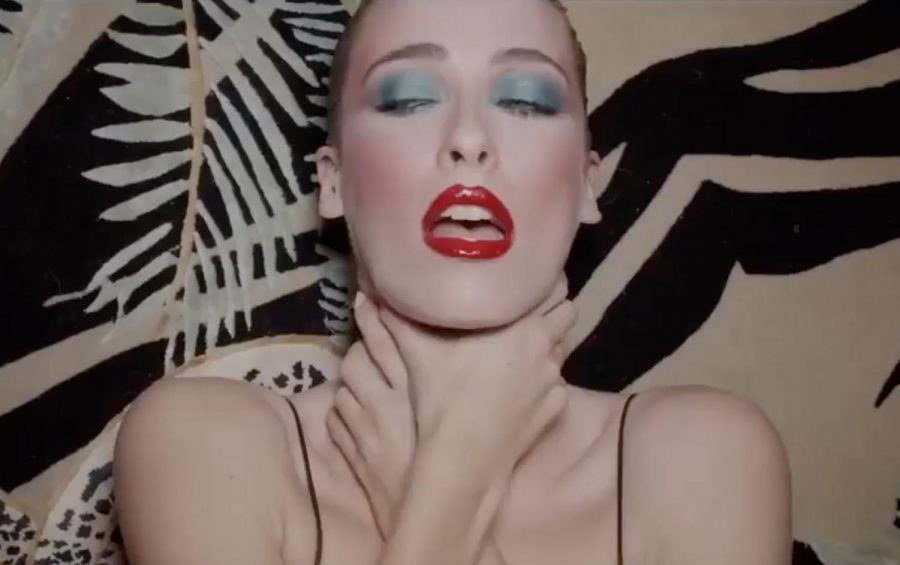Journal entry by UVM senior goes viral in video featuring Cynthia Nixon
April 13, 2020
“‘Be a lady,’ they said.”
These words, repeated throughout a viral Feb. 24 YouTube video posted by a London magazine called “Girls. Girls. Girls,” were written by UVM senior Camille Rainville.
Rainville’s journal entry, which she wrote in the Howe Library and later posted on Facebook, was taken by Claire Rothstein, the magazine’s founder, and made into a viral video featuring “Sex and the City” actress Cynthia Nixon.
“I think I’m now more frustrated than anything,” Rainville said. “I don’t feel that the representation in the video is really what I would have wanted.”
The video features Nixon reciting the journal entry, along with short clips meant to provide visual examples of the words being spoken.
The words are statements that convey the contradicting demands of women in today’s society, such as “don’t be too fat” and “don’t be too thin.”
Rainville wrote these words in 2018. She didn’t expect them to go viral, she said.
“I was at that time in my life struggling a lot with body image, ideas in the media and how it was affecting my relationship with food,” Rainville said.
She began writing the entry during one of her lectures and finished it in Howe Library. When she finished writing, she shared the entry with her friends.
“I posted it on Facebook to my friends, and then it kind of went viral on Facebook,” Rainville said. “I’m not in any way a writer, or any type of professional, I’m just kind of a girl in my 20s.”
Writing and journaling have been interests of Rainville’s since childhood. Rainville said she was homeschooled, and her mom had her write consistently while growing up.
“Whether it’d be for work, or for nursing school, or whatever I’m doing, just reflecting at the end of the day [and] journaling, that’s just something I’ve done since I was fairly small,” Rainville said.
After Rainville’s post went viral, she was contacted by Rothstein.
“My partner Paul, who directed the video saw it re-posted on Instagram and wanted to make the film for ‘Girls. Girls. Girls.,’” Rothstein said. “He comes from a family of strong women so it really spoke to him.”
Rothstein said although Rainville was not creatively involved with the video, Rainville did give Rothstein permission to use her words.
“She gave us her full permission to take her words and interpret them our way, conveying the aesthetic of the magazine, including editing the poem,” Rothstein said.
Rainville said she remembers the initial interaction, but after not hearing anything, assumed nothing would happen.
“I knew that [Rothstein] had talked about using my writing, and I initially gave her permission way back in 2018,” Rainville said. “Then I never heard from her, so I assumed that nothing had come of it.”
The video was released within weeks of the verdict of the trial of former Hollywood producer Harvey Weinstein. Weinstein was sentenced to 23 years in prison for criminal sexual act and rape, according to a March CNN article.
Camille said the video was released in support of the #MeToo movement, which was sparked following the allegations against Weinstein.
On the afternoon of Feb. 24, nearly two years after she wrote the journal entry, Rainville was leaving class when she received emails from friends who had seen Rothstein’s video on Facebook and YouTube.
Rainville has mixed feelings about the video’s release. Initially, Rainville was excited about the video, but now she feels differently.
“I think the video perpetuates the ideas I was writing about that I didn’t like,” Rainville said. “Here’s this video with lots of thin, white, beautiful, retouched models…that’s not really how I wanted my writing represented.”
The video features models wearing make-up and fashionable clothes, which is not what Rainville had in mind.
Rothstein wanted to use the video to encourage women to be who they want to be.
“The pressures that women are under in society may have originated from patriarchy,” Rothstein said. “But our interpretation was that it was more about the ingrained pressures from society today, the people around us, women and men, ourselves.”
Rainville said she would have wanted more diversity in the video. Though she’s no expert in video production, she said the visual representation in the video did not match what she imagined while writing the piece.
“My idea I guess was more diversity,” Rainville said. “[Video production is] not my scene so I don’t know necessarily what it would look like, but I wasn’t writing about what the pictures in the film necessarily represent.”
Rothstein acknowledges that the fashion industry as a whole could improve its inclusion and diversity. She also said she wasn’t able to include everyone she had originally wanted to feature due to issues with time, money and cancellations.
“Being self-funded and without unlimited resources and publisher and advertising support makes it hard to work with who we want when we want to,” Rothstein said.
Although Rainville doesn’t know how she wanted the video to look, she does have a message she wanted to convey through her writing.
“Whatever standard the media perpetuates, whatever messages you get from all these different sources…it’s unrealistic and it’s unattainable,” Rainville said. “Sometimes it’s better to just shut the TV off and get off Facebook.”







